De Amerikaanse toneelschrijver Christopher Durang werd geboren op 2 januari 1949 in Montclair, New Jersey. Zie ook alle tags voor Christopher Durang op dit blog.
Uit: Sister Mary Ignatius Explains It All For You
„SISTER. But are you living properly?
ALOYSIUS. Yes.
SISTER. And you’re married?
ALOYSIUS. Yes.
SISTER. And you don’t use birth control?
ALOYSIUS. No.
SISTER. But you only have two children. Why is that? You’re not spilling your seed like Onan, are you? That’s a sin, you know.
ALOYSIUS. No. It’s just chance that we haven’t had more.
SISTER. And you go to mass once a week, and communion at least once a year, and confession at least once a year? Right?
ALOYSIUS. Yes.
SISTER. Well, I’m very pleased then.
ALOYSIUS. I am an alcoholic. And recently I’ve started to hit my wife. And I keep thinking about suicide.
SISTER. (thinks for a moment) Within bounds, all those things are venial sins. (to audience) At least one of my students turned out well. (to Aloysius) Of course, I don’t know how hard you’re hitting your wife; but with prayer and God’s grace …
ALOYSIUS. My wife is very unhappy.
SISTER. Yes, but eventually there’s death. And then everlasting happiness in heaven. (with real feeling) Some days I long for heaven. (to Gary) And you? Have you turned out all right?
GARY. I’m okay.
SISTER. And you don’t use birth control?
GARY. Definitely not.
SISTER. That’s good. (looks at him) What do you mean, “Definitely not”?
GARY. I … don’t use it.
SISTER. And you’re not married. Have you not found the right girl?
GARY. In a manner of speaking.
SISTER. (grim, choosing not to pursue it) Okay. (walks away, but can’t leave it, comes back to him) You do that thing that makes Jesus puke, don’t you?“
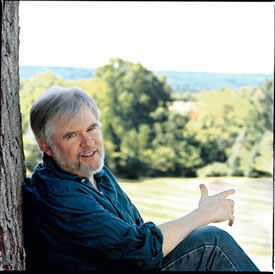
Christopher Durang (Montclair, 2 januari 1949)
De Amerikaanse dichter, criticus en historicus David Shapiro werd geboren op 2 januari 1947 in Newark, New Jersey. Zie ook alle tags voor David Shapiro op dit blog.
Henry Hudson Looks at the Hudson
Henry Hudson turned to me and said:
Be expressionless and strong as me,
Be grim and green, stout as Cortez,
Double lock yourself within
Like a warning wife, and be divorced
From nothing, at last be a statue
Of a self, and threaten at night like a landing,
Turn to your river, like a monist on a raft,
And always found your river on a fault,
Be blind and copper, a mania on a column,
Obscured, finally, by a single cloud of brick.
I love you, that is why I do not talk
About your humorous desire to appease.
Rather complain, like a man, that there is no river.
After Poetry
‘I want my son to grow powerful and rich through science.’ — Rimbaud
Now that I have given up poetry,
The guest of poetry,
Governed poetry,
Or rather that poetry has given up me,
Has queened my pawn, how green my pawn,
Or rather that poetry died in my lap,
Any lap, like a lousy lover
In another language, and I
A Luddite with a laptop in his lap
And now that my son is subtle
And malicious as a god any god.
And bestrides the dogmatic world
As if it were a tennis court
The clouds pass by, almost inhuman
Like passers-by, the mountains like
Churches and the churches like mountains
Beautiful and untranslatable a woman
Walks past the park like a street
Or a scream or a double and triple
Loss of meaning, and I thank whatever
Nothing we actually worship, to change
Nothing and the important thing: to leave
The world alone, largely uninterpreted
For the wet pavement
On which he may scratch his poems
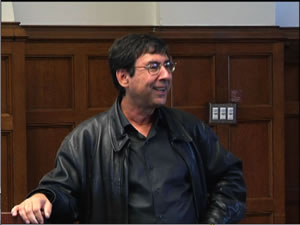
David Shapiro (Newark, 2 januari 1947)
De Amerikaanse dichter en schrijver Jimmy Santiago Baca werd geboren in Santa Fe, New Mexico, op 2 januari 1952. Zie ook alle tags voor Jimmy Santiago Baca op dit blog.
A Daily Joy to be Alive
No matter how serene things
may be in my life,
how well things are going,
my body and soul
are two cliff peaks
from which a dream of who I can be
falls, and I must learn
to fly again each day,
or die.
Death draws respect
and fear from the living.
Death offers
no false starts. It is not
a referee with a pop-gun
at the startling
of a hundred yard dash.
I do not live to retrieve
or multiply what my father lost
or gained.
I continually find myself in the ruins
of new beginnings,
uncoiling the rope of my life
to descend ever deeper into unknown abysses,
tying my heart into a knot
round a tree or boulder,
to insure I have something that will hold me,
that will not let me fall.
My heart has many thorn-studded slits of flame
springing from the red candle jars.
My dreams flicker and twist
on the altar of this earth,
light wrestling with darkness,
light radiating into darkness,
to widen my day blue,
and all that is wax melts
in the flame-
I can see treetops!
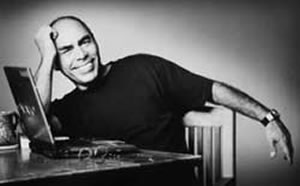
Jimmy Santiago Baca (Santa Fe, 2 januari 1952)
De Noorse schrijver Hans Herbjørnsrud werd geboren op 2 januari 1938 in Heddal, Telemark. Zie ook alle tags voor Hans Herbjørnsrud op dit blog.
Uit: Das Skelett und das Anatomiebuch (Vertaald door Ulrich Sonnenberg)
„Als ich im Winter 1976 die Heimvolkshochschule Sagaheim in Sør-Trøndelag verließ, um hier in Heddal den Erbhof zu übernehmen, nahm ich im Möbelwagen ein Skelett und ein Anatomiebuch mit.
Es hatte sich so ergeben, dass ich an einem stürmischen Februartag kurz vor der Abreise den Auftrag bekam, in der Lehrmittelkammer des alten Gebäudes eine Auswahl der erhaltenswerten Materialien zu treffen. Das Gebäude, in dem Sagaheim seit Gründung der Schule 1898 untergebracht war, sollte abgerissen werden, und wir Lehrer nutzten einen der Samstage, an denen die Schüler nach Hause fuhren, um die Gegenstände, die aufbewahrt werden sollten, auszusortieren und in das nagelneue
Unterrichtsgebäude zu transportieren. Der Rest würde in einer Wolke aus aufwirbelndem Staub unter Holzbalken und splitternden Paneelen begraben werden, wenn der Bulldozer das ungeheure Gespensterschloss mit all seinen verzierten Erkern und Balkonen im Schweizer Stil zertrümmerte. Der Abriss begann einige Monate nach unserer Abreise, zur gleichen Zeit, als daheim unser hinfälliger Altenteiler John Deere den ganzen Tag o-beinig über die Felder humpelte, pflügte, eggte, säte und unter bronchialem Dieselschnaufen seines Auspuffrohrs die Frühjahrsarbeit erledigte.
Meine Aufgabe war es also, die Lehrmittelkammer zu durchforsten, allerdings muss man den Raum, den man auf dem weitläufigen Dachboden zwischen zwei Querbalken unter den Dachsparren eingerichtet hatte, wohl eher als einen Verschlag aus ungehobelten Brettern bezeichnen. Die Sparren
glichen den Rippen eines gewaltigen Brustkastens, und der Dachboden atmete das Wetter ein, heulte und stöhnte in den Windböen und pumpte sich die Lunge voll mit eiskalter Luft an diesem wutschnaubenden Februartag, so dass der undichte Verschlag kalt und klamm wie ein Hatschi! war. Der elektrische Heizstrahler half überhaupt nicht, daher trug ich einen dicken Mantel und stieß Sprechblasen voller Nebelsätze und anderem diffusen Gerede aus, als ich in Pechnahtstiefeln über
die lockeren Bodenbretter stapfte.”
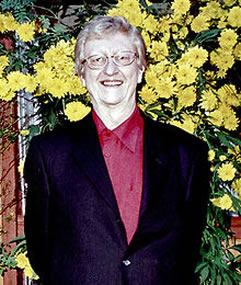
Hans Herbjørnsrud (Heddal, 2 januari 1938)
De Nederlandse dichter, essayist, redenaar en literair-historicus Anton van Duinkerken werd op 2 januari 1903 geboren in Bergen op Zoom. Zie ook alle tags voor Anton van Duinkerken op dit blog.
Uit: Venloo
„Zoodra de lindeboomen in de zomermaanden geuren, weet gij niet meer, uit welken tijd u het trompetgeschal aanwaait van ergens bij den stadswal. Want Venloo ligt in zijn geschiedenis zoo weggedoken, dat deze haar natuurlijke dampkring schijnt en alles kleurt, wat daarin leeft. Een hurkend kind, dat, laat nog buitenshuis, zijn hinkelbaantje met een potscherf teekent in het zand, kon een der negen Muzen zijn of ook de geheimzinnig-onvolwassen bode uit den hemel, die soms de heiligen gewaarschuwd heeft. Het ranke stil staan van een weggedoolde hond, herinnert u aan de Hubertus-legende of mogelijk aan Gerard, heer van Bocholt, wiens ‘steenen huis’ het eerste steenen huis te Venloo was. De man, die langs u loopt, schijnt schuifelvoetend te gaan door het domein van een ouderdom, die niet zijn eigen leeftijd is, doch waarin hij vergroeide tot een eerbiedwaardigheid. Elders had gij zijn gang niet opgemerkt.
En komt de stille nacht, dan ligt over de stad geen enkele nagalm van hedendaagsch leven, maar een zeer breed en haast geruischloos waaien, dat een ademtocht kon zijn, waarin het tijdelijke regelmatig wordt geteld tot eeuwigheid. Een gothisch kerkhof-kruis en een barokke gevelsteen die aan een al te hooge waterstand herinnert, een tralievenster op een onverwachte plaats, de vierkanten massiefheid van kazernes en de smalle rechte voetweg op een stalen brug worden tot samenhoorigheid vereenigd door het eerste donker. Over dit alles waait dezelfde tijd, die slechts als bij toeval ‘vandaag’ is.
Daarom misschien is mij dit oude stadje lief geworden bij een kort bezoek. Niet om zijn oudheid zelf, maar omdat het ‘vandaag’ er zich moeizamer realiseert dan in de moderne steden en dus ook lichter doet gedenken, hoezeer het verleden werkelijkheid is, en hoezeer alles droom wordt naar de toekomst. Wij loopen als over een brug door het bestaan en in het water wordt het spiegelbeeld van onze wandeling gebroken tot grillig bewegende schilfers, die wij opeens als deelen van onszelf herkennen.“
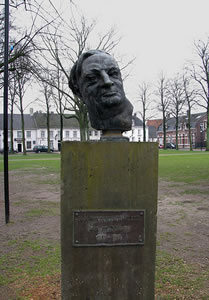
Anton van Duinkerken (2 januari 1903 – 27 juli 1968)
Buste in Hilvarenbeek
De Amerikaanse schrijver, essayist en literatuurwetenschapper André Aciman werd geboren op 2 januari 1951 in Alexandrië in Egypte. Zie ook alle tags voor André Aciman op dit blog.
Uit: Eight White Nights
“Halfway through dinner, I knew I’d replay the whole evening in reverse—the bus, the snow, the walk up the tiny incline, the cathedral looming straight before me, the stranger in the elevator, the crowded large living room where candlelit faces beamed with laughter and premonition, the piano music, the singer with the throaty voice, the scent of pinewood everywhere as I wandered from room to room, thinking that perhaps I should have arrived much earlier tonight, or a bit later, or thatI shouldn’t have come at all, the classic sepia etchings on the wall by the bathroom where a swinging door opened to a long corridor to private areas not intended for guests but took another turn toward the hallway and then, by miracle, led back into the same living room, where more people had gathered, and where, turning to me by the window where I thought I’d found a quiet spot behind the large Christmas tree, someone suddenly put out a hand and said, “I am Clara.”
I am Clara, delivered in a flash, as the most obvious fact in the world, as though I’d known it all along, or should have known it, and, seeing I hadn’t acknowledged her, or perhaps was trying not to, she’d help me stop the pretense and put a face to a name everyone had surely mentioned many times before.
In someone else, I am Clara would have sprung like a tentative conversation opener—meek, seemingly assertive, overly casual, distant, aired as an afterthought, the verbal equivalent of a handshake that has learned to convey firmness and vigor by overexerting an otherwise limp and lifeless grip. In a shy person, I am Clara would require so much effort that it might leave her drained and almost grateful when you failed to pick up the cue.”
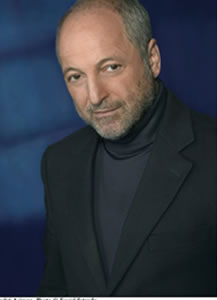
André Aciman (Alexandrië, 2 januari 1951)
Zie voor nog meer schrijvers van de 2e januari ook mijn vorige blog van vandaag en eveneens mijn eerste blog van vandaag.
